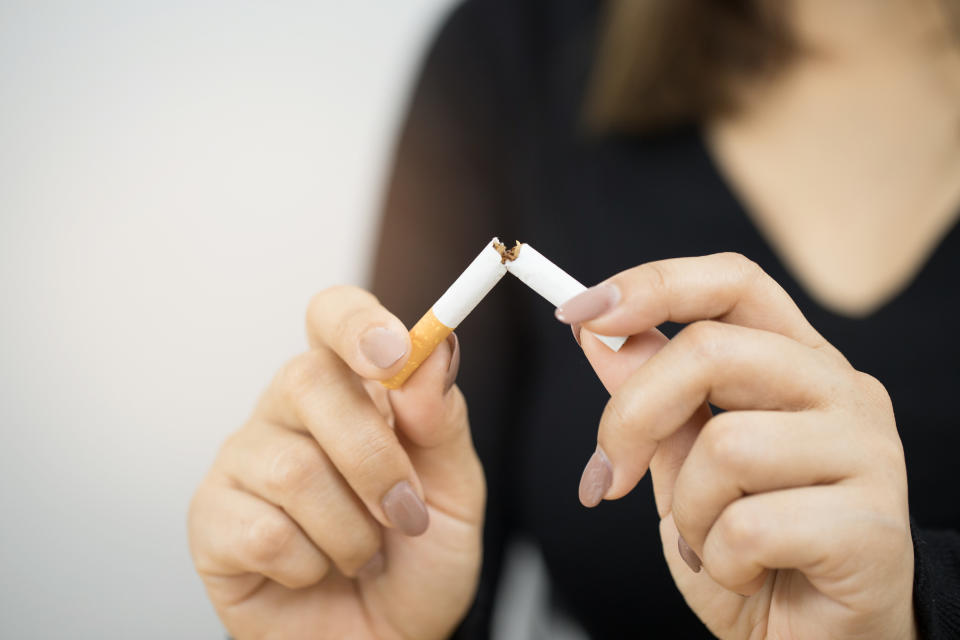Smokers quit but 'high-risk' drinking increased during lockdown, study suggests

Twice as many people in England quit smoking during lockdown than before the coronavirus emerged, research suggests.
Early in the outbreak, the UK’s chief medical adviser Professor Chris Whitty stressed “if you are going to give up smoking, this is a very good moment to do it”.
The advice did not appear to fall on deaf ears, with scientists from University College London (UCL) reporting around 8.8% of smokers quit in April, compared to the 4.1% who ditched the habit before Britons were told to stay at home.
While these results are “encouraging”, the same study found “high-risk” drinking increased during lockdown, which one expert called “a serious cause for concern”.
Read more: Coronavirus vaccine trials will not tell us if a jab saves lives

Previous research has suggested Britons may have fallen into bad habits while spending more time at home.
A study presented at the European and International Congress on Obesity found more than half of us snacked more, exercised less and comfort-ate during the “stay at home” restriction.
To better understand how lockdown influenced other behaviours, the UCL scientists analysed data from the Smoking and Alcohol Toolkit Studies, a series of monthly surveys completed by more than a thousand adults in England.
Results suggest smoking cessation – defined as people claiming to have quit in the past year – more than doubled from an average of 4.1% before lockdown to 8.8% in April.
The number of participants making “any serious attempt to stop smoking in the past year” also rose from 29.1% to 39.6%, the scientists reported in the journal Addiction.
Read more: The risk factors for long COVID
“The fact we saw rates of quit attempts and cessation increase after the start of lockdown is encouraging,” said lead author Dr Sarah Jackson.
“It may be that the pandemic has made people more concerned about the effects of smoking on their respiratory health.
“Stopping smoking brings immediate benefits to health, including for people with an existing smoking-related disease.
“Now is a fantastic opportunity to join the hundreds of thousands of other people quitting in England.
“Quitting may also have the added benefit of reducing demands on our NHS during these difficult times.”
Watch: Can you catch coronavirus twice?
Matt Hancock, secretary of state for health and social care, previously said: “It is abundantly clear from the research into previous coronaviruses that smoking makes the impact of a coronavirus worse.”
The coronavirus behind the ongoing pandemic is one of seven strains of a virus class that are known to infect humans.
Smoking can damage the lungs, reducing their function, as well as suppressing the immune system.
Read more: Nurses describe working amid pandemic
Concerns were raised when in-person stop smoking support services were forced to close during the height of lockdown.
The UCL study found, however, smokers were no less likely to use cessation aids during lockdown than before the restriction was introduced.
The team also saw an increased uptake of remote support, like help-to-quit lines, websites and apps.
While the stop smoking results may be encouraging, the same study found the prevalence of high-risk drinking rose from 25.1% to 38.3%.
High-risk drinking was defined as a score of five or more on the AUDIT-C screening tool, which asks questions like “how often did you have six or more drinks on one occasion in the past year?”.
Unlike the smokers, the high-risk drinkers did not generally seek remote help, with the overall use of “evidence-based support for alcohol reduction” also falling.
“The observed increase in high-risk drinking is a serious cause for concern and requires a public health response,” said co-author Professor Jamie Brown.
“The recent Commission on Alcohol Harm recommended investment in services and measures to reduce affordability.
“These findings also have a possible implication for the pandemic; excessive alcohol consumption may reduce vigilance around social distancing and adherence to other protective behaviours.”
Watch: What is long COVID?


